Published Sep 11, 2017
Michelle Yeoh Sheds Light on Captain Georgiou, Discovery
Michelle Yeoh Sheds Light on Captain Georgiou, Discovery
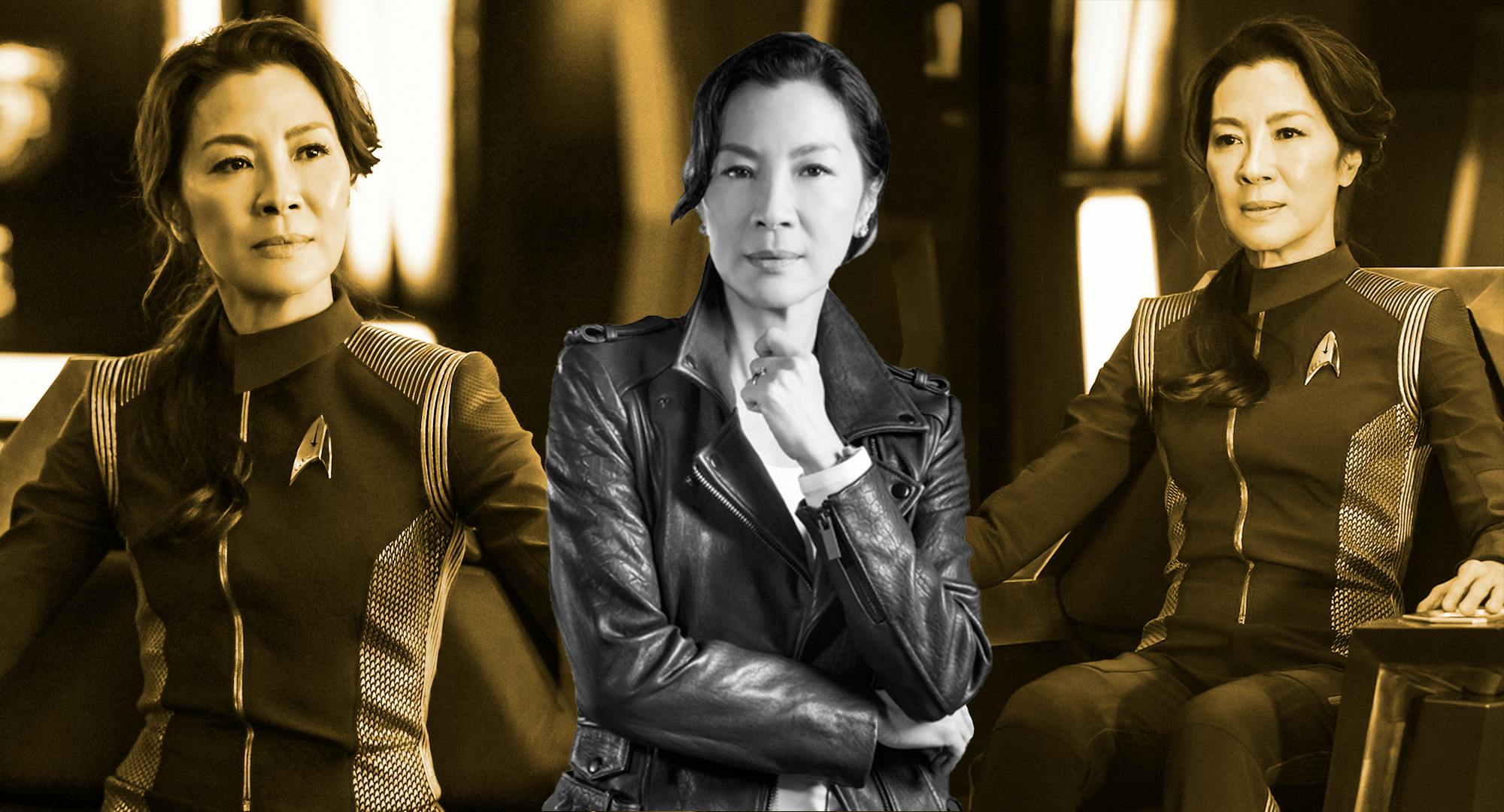
StarTrek.com
“All right,” Michelle Yeoh implored, “Let's rock and roll!”
And, with that energetic greeting, the Malaysian actress and action star spread the good word about the upcoming Star Trek: Discovery as she spoke with a small contingent of journalists – including StarTrek.com – for 20 minutes during a press day in Toronto last month. Yeoh plays Captain Philippa Georgiou, who commands the U.S.S. Shenzhou and shares a tight bond with her first officer, Michael Burnham (Sonequa Martin-Green). Here’s what Yeoh – who is best known for Police Story 3: Super Cop, Tomorrow Never Dies, Crouching Tiger, Hidden Dragon, Strike Back and Marco Polo – had to say about her Trek experience thus far.
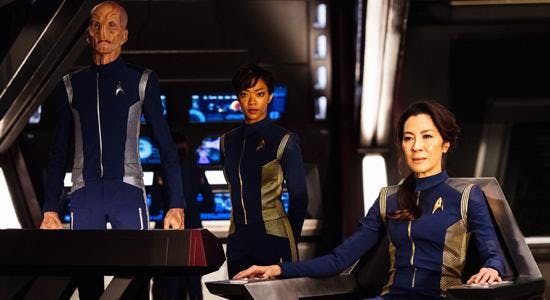
StarTrek.com: What, if anything, did you know about Star Trek before you got involved with Discovery?
Michelle Yeoh: I probably watched it when I was a teenager, way back then. I know Spock really well. He was such a character that stood out. Right? With the pointy ears. And the Vulcan pinch! I think he's cool.
But, I had to revisit again when I knew I was going to do Star Trek and then go... “Oh my God, yes! Then, there's Jean-Luc Picard! Oh my God, that's Captain Janeway! Oh my God, this is...” And suddenly you realize, I'm not going to be able to do all of them because there's like what, almost close to 700 and something episodes? It's over 50 years. That's amazing. They must've been doing something right to keep it going for so long. And then, fortunately, J.J. Abrams came out with the [recent] movies. So that was a blast from the past, right? And it brings back all the memories of the Star Trek series. But if you ask me trivia questions I'm going to leave. [laughs]
How would you say your captain is different from previous captains?
MY: This is a personal thing as an actor. You have to own your character, right? You have to understand what is this role and then after that, you define who is Captain Georgiou. Who is she? Where did she come from? So, I worked very closely with Aaron [Harberts] and Gretchen [Berg], our showrunners, and then with David Semel [who directed the pilot] and some of the writers that were here at that time, and Ted [Sullivan], to get a feel of “When you wrote this character, what were you thinking? Is she married? Does she have family? Does she have that?” Because it forms who she is.
So, I know that she is a war veteran. She has seen the horrors of war because it comes out in the dialogue as well. But she is a very compassionate person. As I look into her, she is an explorer at heart. She loved the universe. She loved the ability and the possibility of seeing new stars, new [stars] being born. She's always awed by that. That's what I love about this character. She's not cynical. She's not jaded by all the things. She firmly believes in the hope and the goodness of humanity. It's very pure to play a character like that, to bring her to the fore, but she's also very smart. Otherwise, she would've been dead a long time ago. [laughs] Space is quite a dangerous place.
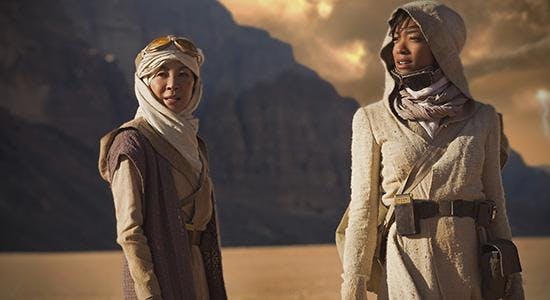
What kind of a relationship does she have with Burnham? Is she a mother figure for her?
MY: Yeah. She is definitely a mentor; even at the prelude you already know that they've been together for seven years. She's obviously the one who's been teaching her, trying to guide her on the right path. But [Burnham’s] background makes it so interesting because she's the only human. She forgot she was human because she was growing up in the Vulcan world. She was becoming more Vulcan than Vulcan itself. She beat herself up to even more than that. And, it's brutal. I don't know how anybody can survive, unless you are a Vulcan, the kind of training you have to get through so that you are so in control and everything becomes about logic and clear cut and things like that.
Sarek, Spock's dad, is a dear friend of Captain Georgiou and he truly believed that Captain Georgiou would be able to instill the good human qualities back into her, because fundamentally she's a human being, right? You cannot deny yourself what you are. So, it's not just about discovery into space and finding new friends and new cultures, species, but it's self-discovery. And, especially for Sonequa's character because when she comes, she is like, "I am the Vulcan of the Vulcans, man." Captain Georgiou's looking at her, "Oh really? We'll see about that.” But it's not about breaking her spirit. She worked so hard to be who she was seven years ago. But it's about putting back, instilling [her human spirit]. “What is love? What is compassion? What is empathy?” Because, if you don't have that, you will make the wrong choices.
Michael Burnham looked at Captain Georgiou first with disdain. Like, "Really? Uh..." But she begins to respect this woman. She understood and began to understand where she came from, what she was trying to teach her, and then that bond was solidified. So much so, it was like a proud parent saying, "You know, I think you're ready to have your own wings. To fly your own ship." And that's a big deal. So that was the special bond that we had, and Sonequa's such an amazing actress. I think it's not easy, the nuances, to keep it in check but still feel all those different emotions, but still no emotions. It's more difficult than being just a Vulcan, in that sense. So, she just nails it. And we have fun. We have so much fun, it's almost incredible.
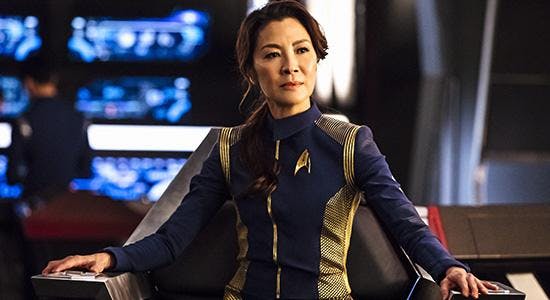
Can you tell us about the two ships, two captains and what the show runners called a second pilot? They repeated the phrase that there will be a second pilot inside the season…
MY: The second story was just as important, so we started to call it the second pilot as well. It's hard because the series is not episodic stories right? It's a story that's evolving and it's growing and it's changing. So, we don't just need one species and “OK, bye-bye, we move on to the next one and find another…” I think it's an interesting and new way of storytelling for Star Trek. It's quite brilliant in that sense because I hope it will be something new.
Shenzhou is an older ship. Discovery is a new ship. I am not ready to relinquish my ship because it's Old Faithful. You don't just say, "Oh, I have a new car, bye!" Right?
You’ve done a bit of TV, including Strike Back and Marco Polo, but nothing like this on an extended weekly basis. What's it like been for you to do a TV series?
MY: Well, the good thing is I had a little taste of it when I did Strike Back, and that was fun. That was their final episode. So, it was a wrap-up, a big wah-hah! And then I did Marco Polo, too, which was set in our world and it was a big story. So, at least I had that taste, because otherwise it would've been very tough [to do Discovery] because it's a very different of style of filming. The first time I'm like, "How many directors do I have? I just got used to you. [laughs]. “David and now it's Adam? Who else is new in the show, you know?"
It's challenging. It's really challenging, but I do love it. I do enjoy it because you get to develop the characters in a much more in-depth way than you would in a movie because in a movie you film it in two months. Then that's it. Here, it does evolve. It does change because, as we're filming, we still don't know what's going to happen in the next episode and what we're going to gain and what we're going to lose. So, we're kept on our toes, like you.
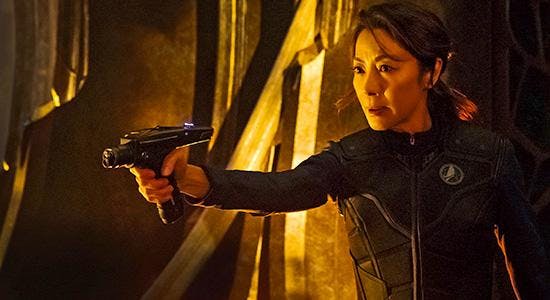
Star Trek has hardcore fans that...
MY: Oh yes! I heard about that! (laughs)
They really love the franchise. They're very…
MY: Very protective of it.
And they also go to conventions and write fan fiction and the list goes on. How ready are you to deal with all that?
MY: I know that Sonequa and Jason [Isaacs], Mary [Chieffo], everybody has been going to Comic-Con and they've been doing things. And I've been like going, "Nope." I have stage fright and I'm like, “Everybody's just gonna throw things at me because I will just say all the wrong things.”
But, I just want the fans to know, I'm not just going to be good at it, I'm gonna be the best at it for you guys. It's like, “Expect something different, please. Think that we are going to give you something that you do not... be ready to embrace the diversity and whatever we throw at you because that's the world of Star Trek, isn't it?”
It's like everything; you have to enter and be brave. You just have to accept there is diversity and new things that come out. So, I think that we have been a little bit smart. It's like, we're 10 years before Captain Kirk and all that. The Prime Directive and all these different rules are not in place, and we are figuring it out. So, in that way, I think it's a little... not easier, but a little bit more flexible in a sense. And this time the story comes from Number One. It's not from the captain's chair, right? From the captain's chair, it's like, "You do what I want because I am the captain." You see it from a different perspective, which I think is very refreshing. And you're not always stuck at the bridge with the captain or in his captain's log.
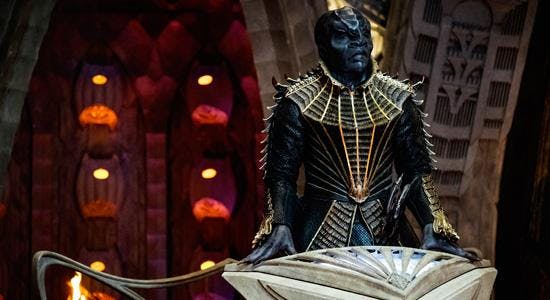
Captain Georgiou is very diplomatic, even in dealing with the Klingons. Why?
MY: She is because she really, truly believes in cooperation, like the first thing that should come out is a gesture of friendship. Not anything else. Because shoot first and ask questions later just simply means, “Let's fight.” That's not Captain Georgiou. That's why Sarek brought Michael Burnham to her, so that she could help to instill these qualities in Michael Burnham, because Michael Burnham would be very cold and logical. Burnham had very bad memories of the Klingons as well, because that's how her parents died. So, for her, it's like, "No! We have to fight them first. Just shoot them, because that's all they understand." That is the direct (opposite) of Starfleet's principles. Never shoot first. Just don't shoot first, right?
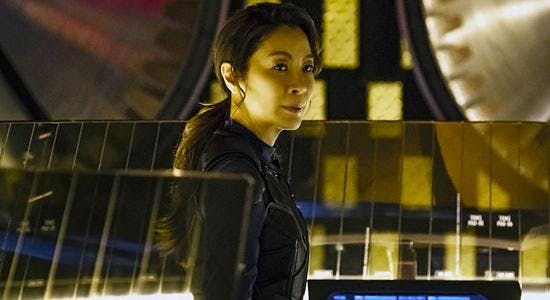
You've been on big movies before. How immersive, how huge are these sets?
MY: Oh, my God! When we started, I was going, "We're shooting a movie here, right?" Marco Polo had amazing sets as well, but they were fixed sets. The dojo, the throne room, they would use them over and over again. You could expect that they would be much more intricate in that sense. Strike Back never had sets. Strike Back just went out on the road, then shot everybody. Then, with this, I was blown away. When you walk into the [Shenzhou] bridge, [you'll say] “Oh, my God.” The floor is all glass. So, you see the universe below your feet and it's all around you. And, of course, there's the captain's chair. It's like everybody dives into that chair until… When I'm there, nobody dares to touch it. [laughs]
But the Klingon ship. Oh my God! Oh my God! You walk in and it's like walking into a cathedral. The details. I'm going, "Excuse me, it's underneath? Who's gonna see that?" So, once you light it, it's like a Goth cathedral. It's just amazing. The quality and look of our costumes… We have our little Starfleet emblems all down our sides. Color is one thing, but that attention to detail, you only do it in the film because you're on the big screen and every little detail sticks out. Normally, you think, “Oh, it's more bark. Nobody will see it.” And you go, "Wow! Really? This long?” It's stunning. It really is.

